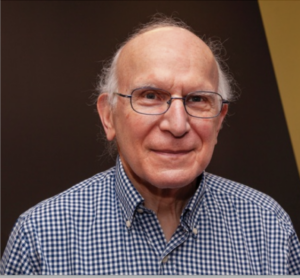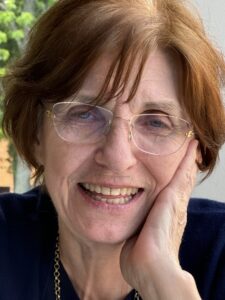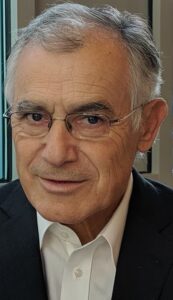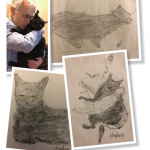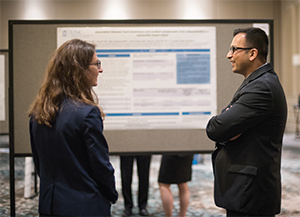
Rheumatology Research Workshop attendees discuss an abstract poster at a poster
session and reception.
Rheumatology Research Foundation donors hope gifts impact knowledge, practice & the future of rheumatology
The mission of the Rheumatology Research Foundation is to advance research and training to improve the health of patients living with rheumatic diseases. To achieve this mission, the Foundation is committed to ensuring a consistent source of funding that supports the growth of the rheumatology workforce, addresses patient care needs and fosters ongoing research in the field. Private investment plays a crucial role in sustaining the specialty. Recently, the Foundation received two major endowment gifts designed to support both established researchers and attract students to the field. These transformational gifts will provide a sustainable funding source and help fuel the future of rheumatology.
James T. Rosenbaum, MD, MACR, and his family committed $1 million to establish the James T. Rosenbaum and Family Endowed Research Fund. This endowment will support established investigators conducting vital research into the causes, prevention and treatment of rheumatic diseases.
A $300,000 gift commitment from George Tsokos, MD, and Maria Tsokos, MD, established the George and Maria Tsokos Endowed Recruitment Fund. It will support a variety of real-world learning experiences to encourage students and residents to learn more about rheumatology and pursue careers in the field.
Dr. Rosenbaum and Dr. George Tsokos recently explained their motivations for the gifts and their passion for research in interviews with The Rheumatologist (TR).
Paying It Forward
Dr. Rosenbaum says his attitudes toward medicine and philanthropy are rooted in professional gratitude, family legacy and personal experience. His father, Edward E. Rosenbaum, MD, was Oregon’s first rheumatologist and a pioneer in the field.
Continuing this legacy, Dr. Rosenbaum, built a distinguished career as a rheumatologist, immunologist and researcher, serving for more than 20 years as the Edward E. Rosenbaum Professor at Oregon Health & Science University, Portland. His research and clinical expertise usually involve ocular inflammatory diseases.
Dr. Rosenbaum is part of a family of physicians, which includes his late father, his wife, two brothers, one sister-in-law and two daughters. Dr. Rosenbaum’s wife, cardiologist Sandra J. Lewis, MD, has led efforts to support mid-career female cardiologists through the American College of Cardiology.
TR: For you, medicine is a multi-generation family endeavor. Why did you specialize in the intersection of rheumatology and ophthalmology, and how did your family influence that decision?
Dr. Rosenbaum: My formal training is in internal medicine and rheumatology. As a fellow in the 1970s, I wanted to establish a rodent model that would be informative for spondyloarthritis. I injected rats with killed bacteria in the footpad. I chose bacteria that were known to trigger reactive arthritis. The rats developed eye inflammation and no joint inflammation. When the pathologist told me the rats had developed uveitis, I had no idea what it meant. So I volunteered at an eye inflammation center, the Proctor Foundation in San Francisco, to learn more about the clinical disease I had stumbled upon in rats.
The U.S. National Institutes of Health (NIH) supported my eye research for 41 years. For seven of those years, I served as a chief of ophthalmology at the Legacy Devers Eye Institute in Portland, while also chairing the Division of Arthritis and Rheumatic Diseases at Oregon Health & Science University. My father established that division, and he was a marvelous role model.
TR: How is research important to rheumatology education?
Dr. Rosenbaum: I have practiced rheumatology long enough that the drugs we used primarily for our—arguably—major diseases, rheumatoid arthritis (RA) and lupus, are no longer the standards of care for those diseases. It’s through research that our understanding of the diseases has changed, and consequently, our approach to therapy has changed—and it’s markedly improved. Both diagnoses contained or had associated implications for mortality when I started as faculty back in the early 1980s. Because of research, there’s less mortality than we saw some 40 years ago.
TR: Why did you make this investment to support research?
Dr. Rosenbaum: Part of [this decision] is what goes around comes around. The Foundation has been very generous and supportive of me. My gift is payback, partly because research has been such a major component of my own career. I would like to help young investigators as I was helped. I twice received the Innovative Research Award from the Foundation. When I didn’t feel the NIH was likely to fund experiments in my laboratory, Foundation awards helped me conduct research that allowed me to gain information and insights that would facilitate an even larger application from the NIH.
TR: Given the current uncertainty about NIH funding for research, how do you think your gift will help people?
Dr. Rosenbaum: There’s tremendous uncertainty about many aspects of our federal government, including funding for science. Philanthropy and non-governmental support for research are both critical. No question about it.
I was very fortunate to have continuous NIH funding for 41 years, and it obviously shaped my perspective and research. The Foundation helped me pursue concepts that were in the incubation stage, but not quite ready for prime time via funding from NIH.
TR: What are your goals for your donation?
Dr. Rosenbaum: I have practiced rheumatology long enough to appreciate how much research has transformed practice. The Rosenbaum family donation is small within the universe of philanthropy, but my hope is that it can impact knowledge, practice and careers.
If you’re a venture capitalist, you may support biotech, but you wouldn’t expect every idea or concept you support to succeed. And if you’re creative, which I take to be a synonym for innovative, there’s no guarantee that the idea that you have is going to work out. I hope that there are many awards from the donation. It’s not realistic to believe all researchers will impact how we practice rheumatology in the future, but some of them will have major impacts.
Cultivating Passion
Drs. George and Maria Tsokos, both distinguished physician-scientists, met at Athens Medical School in Greece before advancing their careers at the NIH and in academic medicine. They now work at Beth Israel Deaconess Medical Center and Harvard Medical School, Boston. George serves as the chief of the Division of Rheumatology and Clinical Immunology at Beth Israel and is also a professor of Medicine at Harvard. Maria is a professor in residence of medicine at Harvard.
As leaders in the care and study of lupus, together they have advanced knowledge about molecular abnormalities in lupus patients’ immune cells and shed light on how the disease develops and progresses over time.
TR: Why did you decide to specialize in rheumatology?
Dr. George Tsokos: Before coming to this country, I did my first research fellowship in cellular immunology in Athens. I came to love immunology. When I arrived at NIH in 1979, I landed in its arthritis branch. I met people working on lupus with great enthusiasm, and I became enamored with the disease.
I did my clinical fellowship in rheumatology at NIH, along with a fellowship in clinical immunology. During that time, I had the opportunity to do both basic and translational research with several senior investigators. We identified new clinical entities and described defective cytotoxic T and natural killer cell responses in patients with lupus.
I moved on and established my own laboratory at the Uniformed Services University and the Walter Reed National Military Center, Bethesda, Md., where I continued studying lupus and mechanisms of tissue injury until 2006. I was recruited to head the Department of Rheumatology and Clinical Immunology at the Beth Israel Deaconess Medical Center and to establish a lupus center.
Maria began a fellowship, followed by a residency in pathology at the National Cancer Institute. (NCI). During her training, she frequently interacted with clinical investigators from the Arthritis Branch, presenting pathology findings at joint conferences. Later, alongside her primary role as a clinician scientist in NCI’s Pathology Laboratory—where her focus was primarily on the diagnosis and classification of pediatric tumors—she engaged in collaborative studies on vasculitis, RA and tissue injury. When I transitioned to Beth Israel, Maria joined our research group, and we have been working together during the past 15 years.
TR: Why do you study lupus?
Dr. Tsokos: Lupus and all other rheumatic diseases are incredibly complex. For most of them, we’ve made a lot of advances in the past 40 years, but lupus is now at an inflection point. We are on the brink of an explosion of new information and therapeutic breakthroughs. It has taken a long time to reach this point, and I think now is the time to study lupus.
Lupus is clinically and pathogenically very heterogeneous. We need to recruit investigators with diverse expertise to advance our understanding of the origin and nature of the disease and develop novel therapeutics. We need to entice strong, skilled, talented and committed individuals into the field at the start of their clinical training, whether in medical school, residency or fellowship, so they can help shape the future of lupus research and care.
TR: What is your take on the importance of rheumatology education?
Dr. Tsokos: Albert Einstein said, ‘It is nothing short of a miracle that modern methods of instruction have not yet entirely strangled the holy curiosity of inquiry.’
We need instruction, but it’s more important to instill curiosity and excitement and passion to ask and address important questions. And that’s what I call education: asking questions. Asking good questions is how you learn.
‘We hope our contribution helps trainees cultivate their own ideas, ask meaningful questions & shape the future of rheumatology.’ —George Tsokos, MD
TR: What inspired you to direct your investment toward supporting trainees in gaining real-world experiences in rheumatology?
Dr. Tsokos: I want trainees to feel they’re welcomed into the field, there are resources to help them and they are part of a group of clinician investigators who advance the field and the well-being of our patients.
Maria and I want to inspire people right at the beginning of their careers. I want them to have support like Maria and I had, to see that people care about them and the field, and be inspired to advance it. We believe in fostering a passion for the field in our trainees, empowering them to take the lead in exploring and addressing the questions that drive their curiosity and ambition.
My career has been shaped by a deep excitement to ask good questions, develop the tools to answer them and then produce information that helps us advance knowledge. With each discovery, we generate the next set of questions that will further expand our understanding.
The 19th century writer John Raskin said, ‘There is an enormous difference between knowledge and education.’
Education is invaluable, and medical school teaches us how to process knowledge, but that alone is not enough. True advancement comes from applying that knowledge to real-world challenges, continuously questioning, learning and contributing to the evolution of our field.
TR: How do you hope your gift will strengthen the rheumatology workforce?
Dr. Tsokos: If our support inspires even one person to develop a passion for rheumatology and a drive to generate new knowledge, then Maria and I will feel our gift has been well spent.
The novelist and essayist John Gardner said, ‘Much education today is monumentally ineffective. All too often, we’re giving our young people cut flowers when we should be teaching them how to grow their own plants.’ We hope our contribution helps trainees cultivate their own ideas, ask meaningful questions and shape the future of rheumatology.
Contribute
Other rheumatologists and ACR/ARP members who want to support work to improve the health of people with rheumatic diseases can make a tax-deductible donation online: www.rheumresearch.org/donate.
Deborah Levenson is a writer and editor based in College Park, Md.
